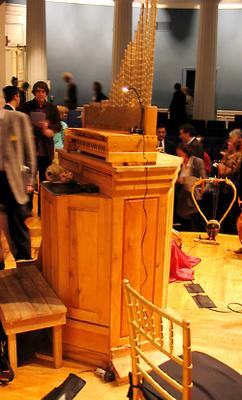Ancient Greek Music at the Corcoran
 Ancient Greece gave us so much artistically -- the foundations of tragedy and comedy, philosophy, sculpture, architecture, painting and mosaic. You will not be surprised to learn the lesser-known ways that Greek music theory -- or at least European misunderstandings of it -- is the cornerstone of the medieval and common practice musical systems. Through the Roman intermediary of Boethius, medieval theorists and, to a lesser extent, singers learned about Pythagoras's experiments with the anvils, leading to the formulation of mathematical ratios that explained some of the intervals used in music to the present day. Preserving Boethius's misunderstanding of the Greek modes, medieval modes were named for regions of ancient Greece.
Ancient Greece gave us so much artistically -- the foundations of tragedy and comedy, philosophy, sculpture, architecture, painting and mosaic. You will not be surprised to learn the lesser-known ways that Greek music theory -- or at least European misunderstandings of it -- is the cornerstone of the medieval and common practice musical systems. Through the Roman intermediary of Boethius, medieval theorists and, to a lesser extent, singers learned about Pythagoras's experiments with the anvils, leading to the formulation of mathematical ratios that explained some of the intervals used in music to the present day. Preserving Boethius's misunderstanding of the Greek modes, medieval modes were named for regions of ancient Greece.
At the Corcoran Gallery of Art last night, the Embassy of Greece sponsored a special concert featuring reproductions of ancient Greek instruments. The centerpiece of the concert, and pretty much the entire reason that I was there, was the opportunity to hear a reproduction of the hydraulis, the earliest known form of the organ. We knew about this instrument, invented by an engineer named Ctesibius in the 3rd century B.C. in Alexandria, from ancient writings and illustrations, especially its use of a water pump to force air through pipes (as shown on the Archeology Channel). However, in 1992, archeologists found fragments of an actual hydraulis, dated to the first century B.C., in a place called Dion, Greece, at the foot of Mount Olympos. Based on what they found, experts at the European Cultural Centre of Delphi made a reproduction of the hydraulis in 1999, and it has been carried around the world for concerts. This was its first appearance in the United States.
What does this thing sound like? Basically, it sounds like a really crummy organ. The pipes have a lot of chiff, and the sound of each pipe is accompanied by pronounced buzzing, not unlike a circus calliope, and the loud clacking of the wooden keys. The hydraulis was played by Panagiotis Stefos, who led his performing ensemble, LyrAvlos, playing on the reproductions of other ancient Greek instruments. There are not that many actual pieces of notated music from ancient Greece, and many are fragments. Happily, this concert included some of those pieces, in fairly simple arrangements, well suited to the monophonic melodies recorded. In fact, the first stasimon from Euripides' Orestes and the Epitaph of Seikilos were included in the recordings of the Norton Anthology, representing ancient Greek music to thousands of students in music history survey classes. The latter is one of the prettiest tunes I know. We also heard a Hymn to Nemesis by Mesomedes, the First Delphic Hymn by Athenaeus, and the Hymn to the Holy Trinity from the Papyrus 1786 Oxyrhynchus.
These renditions of actual ancient Greek melodies seemed more or less plausible, although better performances could be imagined (in fact, the recording of the Epitaph of Seikilos in the Norton Anthology is much better). Unfortunately for me, the five pieces actually from ancient Greece were on the same program with pieces "from ancient Greece." As composed and even improvised by Panagiotis Stefos, these pieces are, yes, Greek but no more ancient than any other New Age folk music, which is what it mostly sounded like.




















































3 comments:
Charles, sorry you didn't have a more overall thrilling evening of "ancient Greek music." I had a similar (disappointed) response when I heard an ensemble led by Panagiotis Stefos years ago.
And thanks a million for your hydraulis review. It was a joy to read, and now I can well imagine its sound.
Garth,
It was pleasant enough, and the crowd seemed to like it. It was just not what I was really interested in hearing. What was his group called when you heard him? Was that in Greece?
Charles, I actually missed the concert by this group when they performed a few years back in Berlin (either at the House of World Culture in the Tiergarten, or at the Dahlem Museum -- my memory is a bit hazy), but I happened to catch them later on German radio. I also have what I assume is a CD by them on a German label. I recall the grainy black and white photos in the booklet showing some of the reconstructed instruments (sans hydraulis).
Two previous encounters with Greek music projects... Gregorio Paniagua and his Atrium Musicae de Madrid played at the Terrace Theater soon after it opened. To me, that was a less than satisfactory, again rather new agey, evening (you probably know their Archiv recording).... Much more positively, in high school (in Berkeley) I saw some touring male group that did staged and lighted choral songs and dances from Greek tragedies. Now, that was one of the most interesting and influential evenings of my life!!
(I haven't been to Greece since 1994 - and 1974!)
Post a Comment